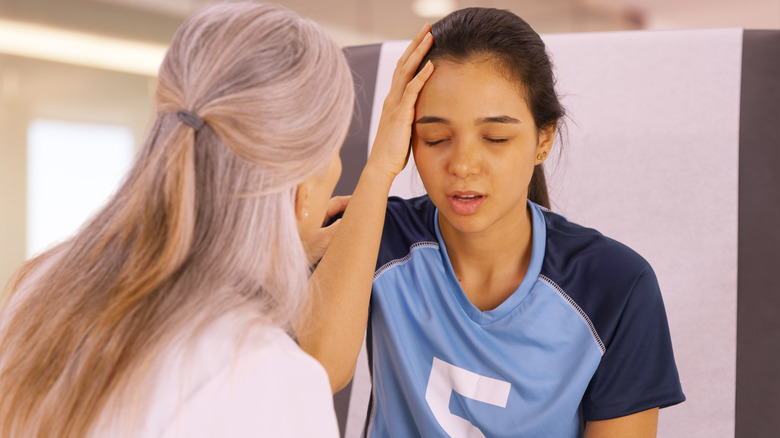The One Thing You Should Never Do After A Head Injury
Following the sudden and unexpected death of Bob Saget, whose body was found in an Orlando hotel room in January, the internet lit up with discussion about head injuries. That's because, following an autopsy, Saget's family released a statement revealing that the actor's death was due to an accidental head injury, in which he "hit the back of his head on something, thought nothing of it and went to sleep" (via BestLife). In response, doctors and media outlets have been talking about what to do, and what you should definitely not do, after a head injury.
It's true that people bump their heads all the time, and it is often a minor injury with no long-lasting ill effects. But if trauma to the head is moderate or severe, and especially if the individual is an older adult or on blood thinners, it can be – and often is – serious. Johns Hopkins Medicine reports that head injuries are on the rise and are one of the most common causes of disability and death in adults.
It may be that because minor head bumps are so common, we tend to dismiss more serious ones, too. But we shouldn't. Effects from a head injury could manifest immediately, or they can develop gradually over hours or days (via Drugs.com).
If there are concerning symptoms, get immediate medical help
What makes head injuries so easy to dismiss is that the symptoms of serious injury are often invisible on the surface. Dr. Gregory Zipfel, head of the department of neurosurgery at the Washington University School of Medicine in Missouri, explains, "People can initially look good, but something severe or something serious may be happening inside their skull in the brain that within hours is going to become apparent" (via BestLife). That's why the worst thing you could do after a head injury is to ignore it and not take it seriously.
Instead, doctors urge us to be on the lookout for any concerning symptoms following trauma to the head. Dr. Sanjay Gupta, a leading American neurosurgeon, tells CNN, "I don't want to necessarily frighten people – but [there] are some indicators, some clues, that you should get this checked out."
If you or someone close to you has slurred or confused speech, is unresponsive or vomiting, has irregularly sized pupils, or other concerning symptoms, call 911 immediately. And if you're in doubt about whether symptoms are serious or not, play it safe and get medical attention anyway. While waiting for medical help to arrive, don't leave the person alone, and try to keep them still to minimize any further injury.

